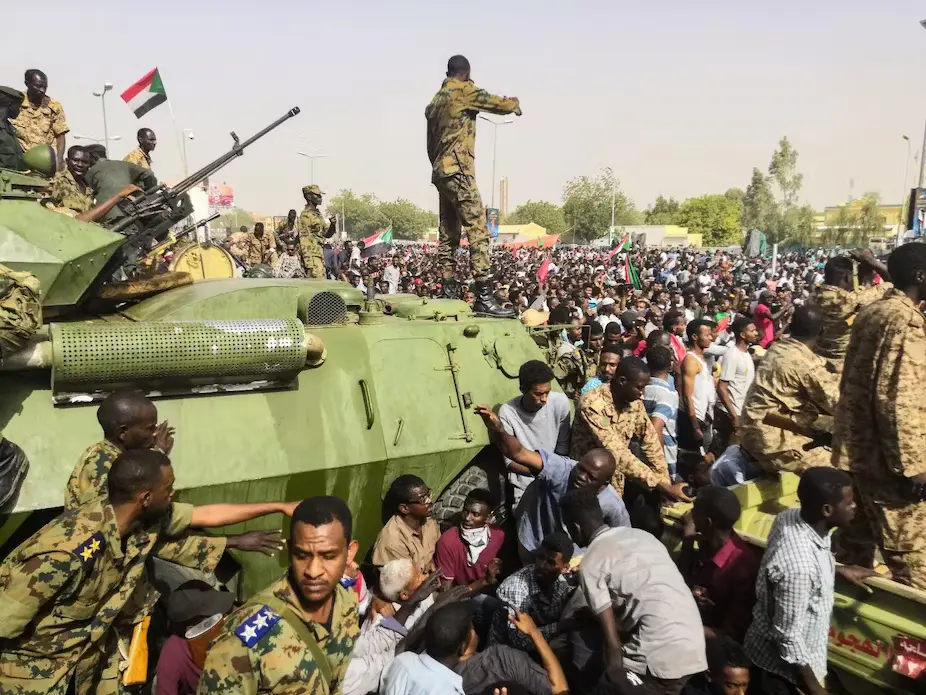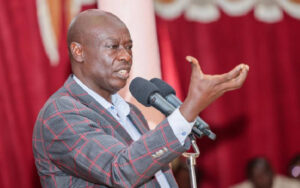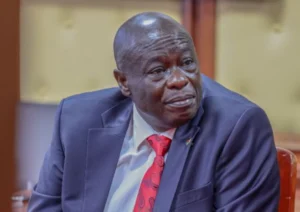Yesterday another coup shook the political landscape of Africa, with Gabon’s Ali Bongo becoming the latest leader to be detained within the confines of his own residence.
This coup follows closely on the heels of the hostage situation involving Niger’s President Mohamed Bazoum.
As we look through the recent surge of coups in West and Central Africa, a disheartening pattern emerges, one that reveals a mix of disappointments, frustration, and the erosion of democratic processes.
Read also: Coup Wave in Africa Fuels Geopolitical Tensions: An opportunity for Russia
![Crowds took to the streets to celebrate the military takeover. [Photo/REUTERS]](https://news.switchtv.ke/wp-content/uploads/2023/08/130939522_01b8ea60df5c2545155977ba72f200cbc551b67894_379_5196_29231000x563.jpg.webp)
The Rapid Sequence of Coup D’états
The alarmingly rapid succession of coups in the region has left many bewildered, prompting concerns about the future of democracy.
Over the past three years, seven coups have unfolded in five countries, punctuated by the military’s assumption of power in Chad.
![This handout file photo released by the Chad Presidential Palace on April 27, 2021 shows General Mahamat Idriss Deby, Chad’s Transitional Military Council (TMC) leader, delivering a message at the presidential palace in N’Djamena. – A year ago, the Chadian army announced that Chadian President Idriss Deby Itno, who had ruled the country for 30 years, had been killed on the front line by the rebellion. On April 20, 2021, his son Mahamat Idriss Deby Itno, a 37-year-old general, was proclaimed head of a junta and president of the transitional republic. [Photo/AFP]
Africa](https://news.switchtv.ke/wp-content/uploads/2023/08/Idriss-Deby-1200x675.jpg)
The triggers for these coups are multifaceted, combining factors of economic disparity, corruption, disappointed youth, and a growing resentment towards traditional political establishments.
A Disappointed Youth and Political Elite
Younger citizens in the region have grown increasingly disappointed with the ruling political class. High unemployment rates, limited economic opportunities, and perceived corruption among the elite have fueled resentment.
![Protesters running away from Tear gas at Kencom Nairobi, Kenya on 20/03/23 during Kenyan Protests [Photo/Courtesy]Africa](https://news.switchtv.ke/wp-content/uploads/2023/07/Copy-of-Cover-photo-20-1200x675.webp)
Read also:Azimio Resumes Demos on Wednesday, After the Saba Saba Nationwide Protests
The persistent influence of former colonial powers, like France, in these nations further aggravates this discontent.
Moreover, the manipulation of electoral processes and constitutional rules to extend presidential terms has undermined the faith in democratic institutions, eroding the moral authority of organizations like the African Union and ECOWAS.
![Many people in Mali welcomed the coup staged by Col Assimi Goïta. [Photo/GETTY IMAGES] Africa](https://news.switchtv.ke/wp-content/uploads/2023/08/130918349_gettyimages-1238000546.jpg.webp)
Dr. Amina Ndiaye, a political analyst, says, “The erosion of democratic norms has created a breeding ground for military interventions. The combination of economic struggles and perceived political manipulation has left many feeling voiceless.”
A Case Study: Gabon’s Political Upheaval
Gabon’s recent coup, which led to the detention of Ali Bongo, Symbolizes these complex dynamics.
Many Gabonese harbored unbelief about Bongo’s bid for a third term, considering his health issues and doubts about effective leadership.
![Gabon's deposed President Ali Bongo was accused of dynastic rule [Photo/GETTY IMAGE] Africa](https://news.switchtv.ke/wp-content/uploads/2023/08/130941522_gettyimages-1636025076.jpg.webp)
Despite early efforts to modernize the government and address social inequality, his rule gradually lost momentum, and elections grew less transparent.
Political historian Dr. Marie Soumah says , “Gabon’s history of controversial elections and opaque electoral practices fueled public distrust. When people feel their voices aren’t heard through legitimate channels, they may turn to other means.”
The coup in Gabon serves as a stark reminder of the intricate interplay between individual nation-specific motivations and broader regional discontent.
The Future of Democracy
As we navigate this disconcerting trend, questions arise about the future of democracy in the region.
The string of coups has underscored the need for renewed efforts to address economic disparities, ensure transparent elections, and bolster democratic institutions.
The role of international organizations in mediating these crises and pressuring coup leaders to restore civilian rule becomes ever more crucial.
Dr. Benjamin Kone, a governance expert, emphasizes saying, “For democracy to thrive, leaders must heed the calls for inclusive governance and transparency. Addressing these concerns head-on will be essential to prevent further erosion of democratic norms.”
Read also: Russia’s Invasion of Ukraine: Unraveling Putin’s Motives and Geopolitical Factors
In a landscape fraught with complex challenges, West and Central Africa faces a critical juncture. The recent coup epidemic underscores the urgent need for comprehensive reforms that resonate with citizens’ aspirations and restore their faith in democratic processes.
Subscribe to Switch TV
















